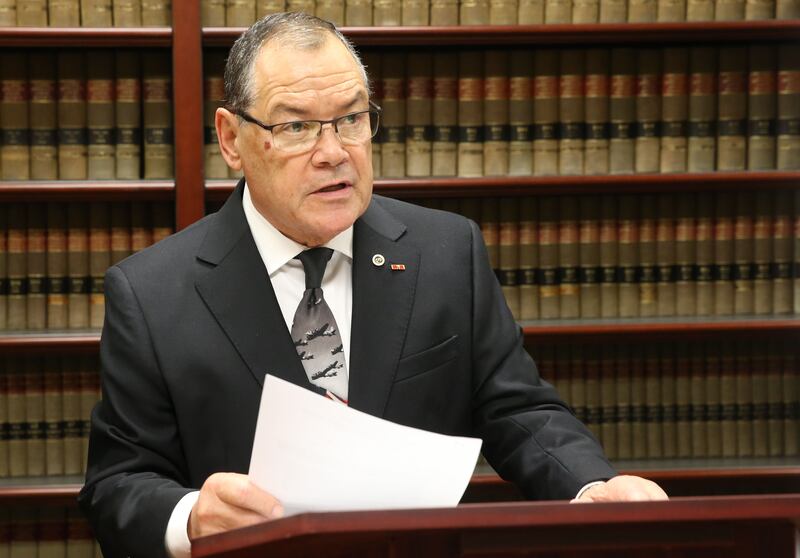Put an ankle bracelet on a suspect, and they’ll remove it or simply “forget” to charge it. Fines aren’t getting paid anymore. The jails were supposed to be less full, and that simply hasn’t happened.
Police and prosecutors in the Illinois Valley said they’d be happy if the SAFE-T Act simply were repealed. None expect that to happen, but all had proposals for how to maybe make it work better.
“Among the changes I’d like to see with the SAFE-T Act would be to increase the list of detainable offenses and stronger consequences for those who violate the terms of their pretrial release,” Bureau County State’s Attorney Dan Anderson said.
Here were the most-cited recommendations from law enforcement:
Revert to cash bond
Step one would be to repeal, or at least limit, the provision that gives all defendants – even murder suspects – the presumption of pretrial release.
“High bonds for more severe or repeat offenses hold a deterrent effect,” La Salle County Sheriff Adam Diss said. “The SAFE-T Act doesn’t allow for the consideration of any previous history. You can have a lifetime history of violent crime, but commit a new crime and it’s like none of it ever happened.
“They literally laugh because they know the system is slanted in their favor.”
Mendota Police Chief Jason Martin agreed that release should be determined not only by whether an offense is detainable but by the defendant’s criminal history.
“This would allow high-risk individuals to be detained,” he said, “while giving low-risk defendants fair treatment.”
:quality(70)/cloudfront-us-east-1.images.arcpublishing.com/shawmedia/4LIURJTUZZHQJL6NIDPEHMV6OA.jpg)
Exempt some crimes
The SAFE-T Act operates on the presumption that low-level felony suspects are less dangerous to the public and can be safely cut loose. Not always.
Oglesby Police Chief Mike Margis said criminal trespass is a deceptively dangerous offense. It’s common for perpetrators to reoffend, resulting in escalation and violence.
“Amend the [SAFE-T] Act to allow officer discretion in arresting for certain misdemeanors or trespassing when there is evidence of risk of repeated offenses, threat to safety or property damage, so that police can intervene early,” Margis said. “This will give law enforcement some tools to maintain public order.”
La Salle County State’s Attorney Joe Navarro said the courts need to restore detention for shoplifters as well. Increasingly, his office is grappling with serial offenders who won’t stop until they’re taken off the streets.
“Retail thefts in the county are absolutely out of control, because again, there’s no hammer over their heads,” he said. “They go out and commit another.”
Anderson said he wants to see all forms of battery, including misdemeanor counts, become detainable.
“Currently, only domestic battery and certain types of aggravated battery are detainable,” Anderson said. “Any crime of violence should be on the list.”
More funding
Although law enforcement has focused on the expanded rights of the accused, less attention has been paid to the financial burden placed on police departments.
La Salle Police Chief Jason Stubler said the SAFE-T Act mandated training for police officers, and he was all for it – until Springfield refused to chip in.
“When we take a police officer out of the car to put them through training, it requires the department to put another officer in the car on overtime,” Stubler said.
That goes for body cameras, too. Ottawa Police Chief Mike Cheatham said he’s pro-camera, but the public incorrectly believes cameras were a one-time expenditure. Maintenance, storage and public disclosure cost Ottawa police $40,000 a year.
“The initial, one-time purchase of our body camera hardware was partially covered by grant funding,” Cheatham said. “However, the ongoing storage, maintenance, etc., continues to climb each year.”
A quicker hook
Margis isn’t categorically opposed to pretrial release for nonviolent felonies, but he said suspects need to be more readily jailed for not complying with the terms of release.
The surest way to yank a suspect is by damaging or cutting off a GPS monitoring device, resulting in a charge of felony escape. That threshold, Margis said, is too high. The courts should have the authority to rescind pretrial release for failing location checks or traveling outside authorized areas.
Navarro said suspects need to be pulled for making contact with their accusers. Increasingly, suspects try to badger their victims into dropping the charges.
“They start haranguing the victim until the victim is less cooperative and less likely to come to court,” he said. “If we have no victim, we can’t prosecute those cases.”
Restore consecutive sentencing
Once upon a time, a defendant who bonded out and then committed a new offense would face back-to-back prison sentences. No more. The SAFE-T Act eliminated consecutive sentencing mandates and that, Navarro said, needs to be restored.
“Now you can commit as many offenses as you want while you’re out on bond, and the sentences usually run concurrently,” Navarro said. “It absolutely takes away the deterrent for not committing crimes when you’re out on bond.”
Suspects on pretrial release are more dangerous, too. Peru Police Chief Sarah Raymond said expanded pretrial release has escalated the danger to the public and her officers.
“The most dangerous part of an officer’s job is when the offender doesn’t care,” Raymond said, “and knows they can get away with what they are doing.”

:quality(70)/s3.amazonaws.com/arc-authors/shawmedia/638ad18c-1176-4018-bcef-b5560cf36d58.png)